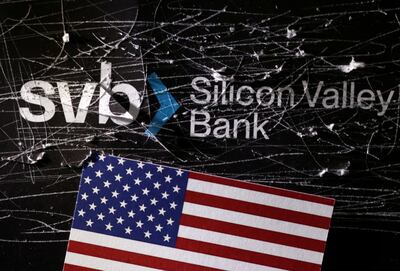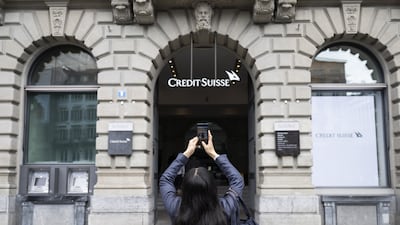Many of us struggle to live with uncertainty, despite it being one of life’s constants. International investors and the banking sector, it seems, struggle with it more than most, if the events of the past 48 hours are anything to go by.
The swift purchase of ailing Credit Suisse by its rival UBS for $3.23 billion, in an audacious attempt to steady the ship of global finance, will result in a wealth manager with more than $5 trillion in total invested assets. This has taken place with the backing of the Swiss state, which allowed the merger to go through without the approval of shareholders and agreed to guarantee 150 billion Swiss francs ($162 billion) of liquidity to Credit Suisse, well beyond the 50 billion francs figure that was announced publicly.
It is the first big test of banking regulation in times of stress since the anarchy of the 2007-2008 financial crisis. The emergency move has been welcomed by the European Central Bank, the US Treasury and the Bank of England.
And yet, no one is quite sure if these steps – coupled with recent US government intervention after the Silicon Valley Bank collapse – will calm the markets and prevent the contagion from spreading further. This is because banks rely on trust. As with much of our personal spending, financial decisions are often driven by emotion. When even a 167-year-old banking giant like Credit Suisse needs an emergency lifeline, it is perhaps understandable that investors and markets have a lukewarm reaction.
That said, the initial signs following the 11th-hour deal are positive and it may be that this intervention staves off wider chaos, avoiding a repeat of 2007-2008. In the US, a marker appeared to have been laid down when decisive action was taken over SVB, such as removing senior management and making sure American taxpayers were not left to foot the bill. President Joe Biden also took the time to hit out at his predecessor Donald Trump’s administration for gutting the banking regulations that were created during the fallout from 2008.
But is it clear that global markets are skittish and unsettled, reflecting the fitful and uneven recovery that has taken place since the Covid-19 pandemic largely ended. External factors such as international sanctions and the continuing war in Ukraine remain destabilising factors.
It is also important to remember that turmoil in the banking sector does not just affect high-rollers. Employees of many of the US start-ups affected by the fall of SVB saw their salary payments affected – that meant trouble for thousands of people trying to pay the bills and provide for their families. As Credit Suisse chairman Axel Lehmann said, the focus is now on the future and the 50,000 Credit Suisse employees, 17,000 of whom are in Switzerland.
Have the lessons of 2007-2008 been learned? In 2022, a paper from the Peterson Institute for International Economics found that “stability will be enhanced if the global community embraces reforms that elevate market resilience, rather than depending on skillful policymakers wielding aggressive but ad hoc policy interventions to ride to the rescue again”.
Sadly, it seems that last-gasp buyouts and emergency state intervention are still part of the international financial playbook. But it may be that SVB and Credit Suisse become the near-misses that proved the wisdom of not allowing failing banks to take down the financial edifice of entire economies. The future is far from certain but success here could be the first step on the road to restoring that most valuable banking commodity – trust.
Company%20Profile
%3Cp%3E%3Cstrong%3ECompany%20name%3A%3C%2Fstrong%3E%20Cargoz%3Cbr%3E%3Cstrong%3EDate%20started%3A%3C%2Fstrong%3E%20January%202022%3Cbr%3E%3Cstrong%3EFounders%3A%3C%2Fstrong%3E%20Premlal%20Pullisserry%20and%20Lijo%20Antony%3Cbr%3E%3Cstrong%3EBased%3A%3C%2Fstrong%3E%20Dubai%3Cbr%3E%3Cstrong%3ENumber%20of%20staff%3A%3C%2Fstrong%3E%2030%3Cbr%3E%3Cstrong%3EInvestment%20stage%3A%3C%2Fstrong%3E%20Seed%3C%2Fp%3E%0A
COMPANY PROFILE
Name: HyperSpace
Started: 2020
Founders: Alexander Heller, Rama Allen and Desi Gonzalez
Based: Dubai, UAE
Sector: Entertainment
Number of staff: 210
Investment raised: $75 million from investors including Galaxy Interactive, Riyadh Season, Sega Ventures and Apis Venture Partners
The Sand Castle
Director: Matty Brown
Stars: Nadine Labaki, Ziad Bakri, Zain Al Rafeea, Riman Al Rafeea
Rating: 2.5/5
The%20specs%20
%3Cp%3E%3Cstrong%3EEngine%3A%20%3C%2Fstrong%3EDual%20permanently%20excited%20synchronous%20motors%3Cbr%3E%3Cstrong%3EPower%3A%20%3C%2Fstrong%3E516hp%20or%20400Kw%3Cbr%3E%3Cstrong%3ETorque%3A%20%3C%2Fstrong%3E858Nm%3Cbr%3E%3Cstrong%3ETransmission%3A%20%3C%2Fstrong%3ESingle%20speed%20auto%3Cbr%3E%3Cstrong%3ERange%3A%20%3C%2Fstrong%3E485km%3Cbr%3E%3Cstrong%3EPrice%3A%20%3C%2Fstrong%3EFrom%20Dh699%2C000%3C%2Fp%3E%0A
Lexus LX700h specs
Engine: 3.4-litre twin-turbo V6 plus supplementary electric motor
Power: 464hp at 5,200rpm
Torque: 790Nm from 2,000-3,600rpm
Transmission: 10-speed auto
Fuel consumption: 11.7L/100km
On sale: Now
Price: From Dh590,000
Dengue%20fever%20symptoms
%3Cul%3E%0A%3Cli%3EHigh%20fever%3C%2Fli%3E%0A%3Cli%3EIntense%20pain%20behind%20your%20eyes%3C%2Fli%3E%0A%3Cli%3ESevere%20headache%3C%2Fli%3E%0A%3Cli%3EMuscle%20and%20joint%20pains%3C%2Fli%3E%0A%3Cli%3ENausea%3C%2Fli%3E%0A%3Cli%3EVomiting%3C%2Fli%3E%0A%3Cli%3ESwollen%20glands%3C%2Fli%3E%0A%3Cli%3ERash%3C%2Fli%3E%0A%3C%2Ful%3E%0A%3Cp%3EIf%20symptoms%20occur%2C%20they%20usually%20last%20for%20two-seven%20days%3C%2Fp%3E%0A
The rules on fostering in the UAE
A foster couple or family must:
- be Muslim, Emirati and be residing in the UAE
- not be younger than 25 years old
- not have been convicted of offences or crimes involving moral turpitude
- be free of infectious diseases or psychological and mental disorders
- have the ability to support its members and the foster child financially
- undertake to treat and raise the child in a proper manner and take care of his or her health and well-being
- A single, divorced or widowed Muslim Emirati female, residing in the UAE may apply to foster a child if she is at least 30 years old and able to support the child financially
The White Lotus: Season three
Creator: Mike White
Starring: Walton Goggins, Jason Isaacs, Natasha Rothwell
Rating: 4.5/5
UAE currency: the story behind the money in your pockets
The%20specs
%3Cp%3E%3Cstrong%3EEngine%3A%3C%2Fstrong%3E%202-litre%204-cylinder%3Cbr%3E%3Cstrong%3EPower%3A%20%3C%2Fstrong%3E153hp%20at%206%2C000rpm%3Cbr%3E%3Cstrong%3ETorque%3A%20%3C%2Fstrong%3E200Nm%20at%204%2C000rpm%3Cbr%3E%3Cstrong%3ETransmission%3A%20%3C%2Fstrong%3E6-speed%20auto%3Cbr%3E%3Cstrong%3EFuel%20consumption%3A%20%3C%2Fstrong%3E6.3L%2F100km%3Cbr%3E%3Cstrong%3EPrice%3A%20%3C%2Fstrong%3EDh106%2C900%3Cbr%3E%3Cstrong%3EOn%20sale%3A%20%3C%2Fstrong%3Enow%3C%2Fp%3E%0A
Groom and Two Brides
Director: Elie Semaan
Starring: Abdullah Boushehri, Laila Abdallah, Lulwa Almulla
Rating: 3/5
PROFILE
Name: Enhance Fitness
Year started: 2018
Based: UAE
Employees: 200
Amount raised: $3m
Investors: Global Ventures and angel investors
UAE currency: the story behind the money in your pockets
Specs
Engine: 51.5kW electric motor
Range: 400km
Power: 134bhp
Torque: 175Nm
Price: From Dh98,800
Available: Now
Griselda
%3Cp%3E%3Cstrong%3EDirector%3A%3C%2Fstrong%3E%C2%A0Andr%C3%A9s%20Baiz%3C%2Fp%3E%0A%3Cp%3E%3Cstrong%3EStarring%3A%C2%A0%3C%2Fstrong%3ESof%C3%ADa%20Vergara%2C%20Alberto%20Guerra%2C%20Juliana%20Aiden%20Martinez%3C%2Fp%3E%0A%3Cp%3E%3Cstrong%3ERating%3A%3C%2Fstrong%3E%204%2F5%3C%2Fp%3E%0A
Profile of Foodics
Founders: Ahmad AlZaini and Mosab AlOthmani
Based: Riyadh
Sector: Software
Employees: 150
Amount raised: $8m through seed and Series A - Series B raise ongoing
Funders: Raed Advanced Investment Co, Al-Riyadh Al Walid Investment Co, 500 Falcons, SWM Investment, AlShoaibah SPV, Faith Capital, Technology Investments Co, Savour Holding, Future Resources, Derayah Custody Co.
Test
Director: S Sashikanth
Cast: Nayanthara, Siddharth, Meera Jasmine, R Madhavan
Star rating: 2/5
EMILY%20IN%20PARIS%3A%20SEASON%203
%3Cp%3ECreated%20by%3A%20Darren%20Star%3C%2Fp%3E%0A%3Cp%3EStarring%3A%20Lily%20Collins%2C%20Philippine%20Leroy-Beaulieu%2C%20Ashley%20Park%3C%2Fp%3E%0A%3Cp%3ERating%3A%202.75%2F5%3C%2Fp%3E%0A



